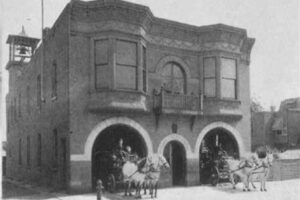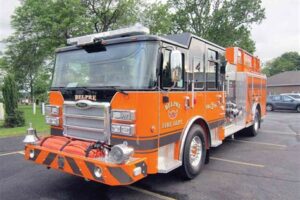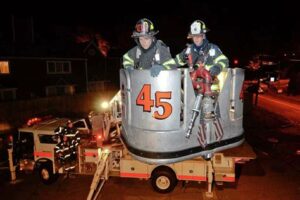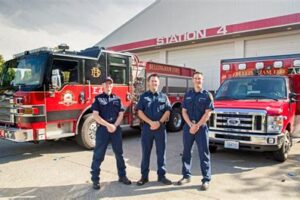Table of Contents
Looking to become a fire volunteer? This article outlines the requirements you need to meet. Learn about the necessary qualifications, training, and certifications needed to join a fire department as a volunteer. Discover how you can contribute to your community’s fire safety efforts and make a difference.
Are you ready to make a difference in your community? Do you have what it takes to face the challenges of fighting fires and saving lives? If you have a strong sense of adventure and a passion for helping others, then becoming a fire volunteer might be the perfect opportunity for you. However, before you grab your gear and rush into action, there are a few requirements you need to meet. From physical fitness to specialized training, this demanding role demands dedication and commitment. So, let’s dive into the essential qualifications that will set you on the path to becoming a respected firefighter.
Introduction
Becoming a fire volunteer is an honorable and selfless way to serve your community. These brave individuals play a crucial role in emergency response, firefighting, and public safety. However, before you can join the ranks of these everyday heroes, there are certain requirements you must meet. This article will outline the essential qualifications and criteria for becoming a fire volunteer.
Physical Fitness
One of the most important requirements for becoming a fire volunteer is maintaining a high level of physical fitness. Firefighters often find themselves in physically demanding situations that require strength, agility, and endurance. Applicants must be able to pass a physical fitness test, which typically includes tasks such as running, climbing stairs, and carrying heavy equipment.
Age Restrictions
While the specific age requirements may vary depending on the jurisdiction, most fire departments have a minimum age limit for volunteers. Generally, individuals must be at least 18 years old to join as a fire volunteer. This ensures that applicants have reached a level of maturity and responsibility necessary for the role.
Background Checks
Fire departments carry out thorough background checks on all potential volunteers. These checks aim to ensure that applicants have no criminal history or any disqualifying factors that may compromise their ability to serve as a firefighter. Any previous convictions or legal issues may be grounds for disqualification.
Education and Training
Fire volunteers are expected to undergo extensive training to develop the necessary skills and knowledge required for their role. This training includes fire science, hazardous materials handling, first aid, and rescue techniques. Additionally, some jurisdictions may require volunteers to complete a specific number of training hours each year to maintain their certification.
Valid Driver’s License
A valid driver’s license is a prerequisite for becoming a fire volunteer in most jurisdictions. Firefighters often need to drive emergency vehicles, such as fire trucks and ambulances, to reach the scene of an incident quickly. Having a clean driving record is also essential, as firefighters may be held liable for any traffic violations or accidents while on duty.
Medical Evaluations
Firefighting is a physically demanding job that can pose health risks. Therefore, fire volunteers are required to undergo comprehensive medical evaluations to ensure they are fit for duty. These evaluations may include physical exams, vision and hearing tests, and assessments of cardiovascular health. Any pre-existing medical conditions that could hinder performance may result in disqualification.
Residency Requirements
Many fire departments have residency requirements for their volunteer firefighters. This means that applicants must live within a certain distance from the fire station to ensure quick response times during emergencies. Residency requirements vary depending on the jurisdiction, so it’s essential to check with your local fire department for specific details.
Commitment and Availability
Becoming a fire volunteer is not just about meeting the necessary qualifications; it also requires a significant commitment of time and availability. Firefighters often work long shifts, including overnight hours, weekends, and holidays. Volunteers must be willing to dedicate themselves to the service and be available on short notice to respond to emergencies.
Strong Communication Skills
Effective communication is vital in any emergency response situation. Fire volunteers must be able to communicate clearly and concisely with their team members, as well as other emergency personnel. Strong verbal and written communication skills are essential for providing accurate information and coordinating efforts during critical moments.
Community Involvement
Fire volunteers are deeply embedded within the communities they serve. They often participate in community outreach programs, fire prevention campaigns, and educational initiatives. Having a genuine desire to engage with and give back to the community is an important characteristic for anyone considering becoming a fire volunteer.
Conclusion
Becoming a fire volunteer requires more than just a desire to help others. It demands a combination of physical fitness, dedication, training, and personal qualities such as strong communication skills and community involvement. By meeting these requirements, you can embark on a fulfilling journey as a fire volunteer, making a difference in the lives of those facing emergencies and protecting your community.
Fire Volunteer Requirements: Ensuring the Safety of Communities through Dedication and Skill
Fires can strike at any moment, threatening the safety of communities and the lives of its residents. In these critical situations, the role of fire volunteers becomes paramount. These dedicated individuals selflessly offer their time and skills to assist professional firefighters in mitigating the devastating effects of fires. However, becoming a fire volunteer is not an easy task. It requires meeting a set of stringent requirements that ensure the volunteers are physically capable, well-trained, and trustworthy. Let’s delve into the key requirements that fire volunteers must fulfill to safeguard their communities.
1. Age and Physical Fitness: A Crucial Prerequisite for Fire Volunteers
Firefighting is a physically demanding profession, requiring strength, stamina, and agility. Recognizing this, fire departments have established age and physical fitness requirements for their volunteers. Prospective volunteers must be at least 18 years old and possess the physical fitness necessary to perform the arduous tasks of firefighting. To ensure their readiness, physical ability tests are conducted, including endurance drills and strength assessments. These tests help determine whether volunteers can handle the physically demanding nature of the role, ensuring they can effectively contribute to firefighting efforts.
2. Mandatory Training: Equipping Fire Volunteers with the Necessary Skills
Firefighting is a highly specialized field that demands extensive knowledge and skills. To ensure that fire volunteers are prepared to face the challenges they may encounter, comprehensive training programs are mandatory. These programs cover a wide range of topics, including fire prevention techniques, emergency response protocols, first aid procedures, and the proper usage of firefighting equipment. By acquiring these essential skills, volunteers become valuable assets during emergency situations, contributing to the overall effectiveness of firefighting operations.
3. Valid Driver’s License: Navigating Emergency Situations with Confidence
Fire volunteers are often responsible for driving firefighting vehicles during emergency responses. To carry out this crucial task efficiently and safely, volunteers must possess a valid driver’s license. Adequate driving skills and a clean driving record are essential requirements, ensuring that volunteers can maneuver through traffic effectively and transport equipment to the scene of the incident. By possessing a valid driver’s license, fire volunteers can confidently navigate emergency situations, fulfilling their role with competence.
4. Background Checks: Ensuring the Trustworthiness of Fire Volunteers
Trust is a fundamental aspect of any community service role, including that of a fire volunteer. To maintain the integrity and safety of fire departments, background checks are conducted on all prospective volunteers. These checks thoroughly investigate criminal records to ensure that volunteers are individuals of good character and have no prior convictions that might compromise their position of trust within the community. By conducting these background checks, fire departments can ensure that only trustworthy individuals are entrusted with the responsibility of safeguarding their communities.
5. Medical Evaluation: A Priority for the Well-being of Fire Volunteers
The health and well-being of fire volunteers are paramount considerations for fire departments. To prioritize these aspects, volunteers are required to undergo medical evaluations. These evaluations involve comprehensive physical examinations that assess their overall health, agility, and fitness levels. By thoroughly evaluating their physical condition, fire departments can determine if a volunteer is fit to participate in strenuous firefighting activities. This ensures the safety of both the volunteers themselves and those they aim to protect.
6. Commitment to Training and Education: Staying Up-to-Date with Firefighting Techniques
Firefighting techniques and protocols are continuously evolving to adapt to new challenges and advancements. Therefore, fire volunteers are expected to commit to ongoing training and educational programs. These programs keep volunteers updated on emerging firefighting techniques, technological advancements, and changes in protocols. By continuously developing their skills and knowledge, fire volunteers remain equipped to handle evolving fire-related challenges, ensuring the safety of their communities.
7. Availability and Flexibility: Being Prepared for Nonlinear Schedules
Emergency situations do not adhere to a predetermined schedule. Fires can break out at any time, requiring an immediate response. Fire volunteers must be flexible and available to respond to such emergencies, regardless of the hour or day. They understand that their commitment extends beyond the conventional workweek and may require their presence during holidays, weekends, or personal events. The willingness to adapt to unpredictable circumstances and prioritize the safety of their communities is an essential characteristic of a dedicated fire volunteer.
8. Strong Teamwork and Communication Skills: Working Cohesively for Effective Results
A successful firefighting operation relies on effective teamwork and communication. Fire departments require volunteers who possess strong teamwork and communication skills. Volunteers must collaborate closely with their team members, follow instructions promptly, and maintain clear and efficient communication during emergency responses. By working cohesively, fire volunteers contribute to an effective and coordinated firefighting effort, maximizing the chances of success and minimizing the risks involved.
In conclusion, fire volunteer requirements are designed to ensure the safety of communities through the dedication and skill of these selfless individuals. From age and physical fitness to mandatory training and background checks, each requirement plays a crucial role in shaping competent and trustworthy fire volunteers. By meeting these requirements, volunteers demonstrate their commitment to protecting their communities and become invaluable assets in the face of adversity.
In today’s society, where emergencies and disasters seem to be occurring more frequently, the role of fire volunteers has become increasingly important in providing immediate support and assistance. These brave individuals selflessly dedicate their time and energy to safeguarding lives and properties, often putting their own safety at risk. To ensure the effectiveness and efficiency of these fire volunteers, certain requirements need to be met. In this article, we will explore the key requirements for becoming a fire volunteer and shed light on their significance.
- Physical Fitness: The foremost requirement for any fire volunteer is maintaining an optimal level of physical fitness. Firefighting is a physically demanding job that involves strenuous activities such as carrying heavy equipment, climbing ladders, and rescuing individuals from danger. Therefore, it is crucial for volunteers to possess good cardiovascular endurance, muscular strength, and overall agility. Physical fitness not only enables them to perform their duties effectively but also ensures their personal safety during emergency situations.
- Firefighting Training: Fire volunteers need to undergo comprehensive training programs that equip them with the necessary skills and knowledge to handle various emergency situations. These training programs cover a wide range of topics, including fire prevention, fire suppression techniques, hazardous materials management, and first aid. By acquiring this training, volunteers become well-prepared to respond to emergencies efficiently, minimizing risks and maximizing effectiveness.
- Teamwork and Communication Skills: Firefighting is a collaborative effort that requires seamless coordination among team members. Therefore, fire volunteers must possess strong teamwork and communication skills. They should be able to work cohesively with other volunteers, follow instructions promptly, and effectively communicate vital information to ensure the safety and success of every operation. These skills also enable them to provide reassurance and support to affected individuals during distressing situations.
- Commitment and Availability: Fire volunteering is not a part-time commitment; it requires a high level of dedication and availability. Emergencies can occur at any time, day or night, and fire volunteers must be prepared to respond promptly. This means being available for on-call shifts, attending regular training sessions, and actively participating in community outreach programs. The commitment to serve the community and willingness to sacrifice personal time are essential qualities that fire volunteers must possess.
- Emotional Resilience: Fire volunteers often witness traumatic events and deal with emotionally challenging situations. Therefore, having emotional resilience is crucial in maintaining mental well-being. Volunteers need to remain composed and focused, even in high-pressure situations, while demonstrating empathy towards those affected. Building resilience through proper coping mechanisms and support systems ensures the longevity of their commitment to firefighting.
These requirements for becoming a fire volunteer lay the foundation for a competent and dedicated force that can effectively respond to emergencies. By meeting these requirements, fire volunteers demonstrate their commitment to serving their communities and protecting lives and properties. Their selflessness and bravery deserve our utmost respect and support.
Thank you for taking the time to visit our blog and learn more about the requirements for becoming a fire volunteer. We hope that you have found the information provided to be informative and helpful in guiding your decision to serve as a valuable member of your local fire department. As you may already know, volunteering in the fire service is an incredibly rewarding experience that allows individuals to make a real difference in their communities. However, it is important to understand the various requirements and commitments involved before embarking on this noble journey.
First and foremost, one of the most crucial requirements for becoming a fire volunteer is a genuine passion for serving others and a strong commitment to public safety. This line of work demands dedication, resilience, and a willingness to put others before oneself. As a fire volunteer, you will be expected to respond to emergency calls at any hour of the day or night, often leaving behind personal obligations or sacrificing precious sleep. It is essential to possess a deep sense of duty and a desire to help those in need, regardless of the circumstances.
In addition to the emotional and physical demands, there are also certain basic qualifications that potential fire volunteers must meet. These typically include being at least 18 years old, possessing a valid driver’s license, and having a clean criminal record. Some fire departments may require additional certifications, such as CPR and first aid training, which can easily be obtained through local organizations or community colleges. It is important to research the specific requirements of your local fire department and ensure that you meet all necessary criteria before applying to become a fire volunteer.
In conclusion, becoming a fire volunteer is not a decision to be taken lightly. It requires a deep commitment, both personally and professionally, but the rewards are immeasurable. By joining the ranks of your local fire department, you will have the opportunity to save lives, protect property, and make a lasting impact on your community. We encourage you to reach out to your local fire department and inquire about their specific volunteer requirements. Remember, the fire service is not just a job; it is a calling to serve and protect. Are you ready to answer that call?
Thank you once again for visiting our blog, and we wish you the best of luck in your journey to become a fire volunteer.
.
As a journalist, I understand the importance of providing clear and concise information to the public. In regards to Fire Volunteer Requirements, here are some common questions that people also ask:
1. What qualifications are needed to become a fire volunteer?
Answer: To become a fire volunteer, you typically need to meet certain qualifications such as being at least 18 years old, having a high school diploma or GED equivalent, and passing a background check. Some fire departments may have additional requirements, such as possessing a valid driver’s license or completing a basic firefighting training program.
2. Are there any physical requirements to become a fire volunteer?
Answer: Yes, firefighting can be physically demanding, so fire volunteers should be in good physical condition. While specific physical requirements may vary depending on the department, it is common for volunteers to undergo a medical examination to ensure they can handle the physical demands of the role. This may include tests of strength, stamina, and overall fitness.
3. Do I need prior experience to become a fire volunteer?
Answer: While prior experience in firefighting or emergency services can be beneficial, it is not always a requirement to become a fire volunteer. Many fire departments offer training programs for volunteers, which provide the necessary skills and knowledge to perform firefighting and rescue tasks effectively. However, having a genuine interest in helping others and a willingness to learn is essential.
4. Are there any age restrictions for fire volunteers?
Answer: Age restrictions for fire volunteers can vary depending on the jurisdiction. In some areas, individuals as young as 16 may be eligible to join a fire department’s junior volunteer program. However, for regular fire volunteering positions, most departments require volunteers to be at least 18 years old.
5. How can I find opportunities to become a fire volunteer?
Answer: If you are interested in becoming a fire volunteer, you can start by contacting your local fire department or fire service organizations. They can provide information about any available volunteer programs and guide you through the application process. Additionally, attending community events or open houses held by fire departments can often be an excellent way to learn more about volunteering opportunities.
I hope these answers help clarify the common questions surrounding Fire Volunteer Requirements. If you have any further inquiries or need additional information, feel free to reach out to your local fire department or fire service organizations.






